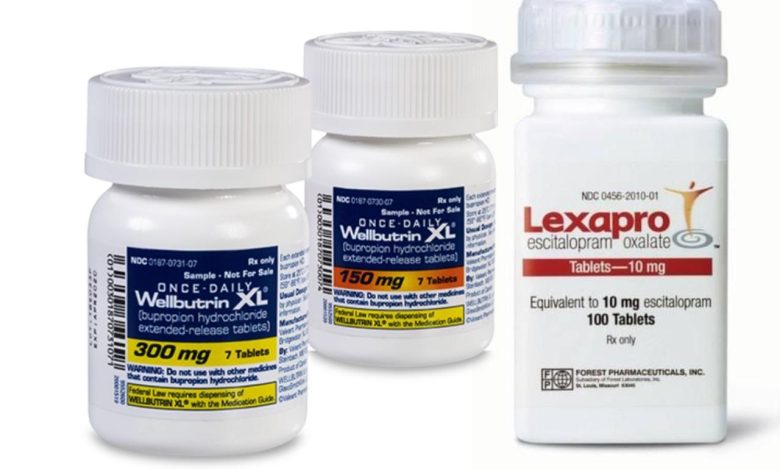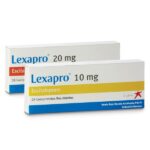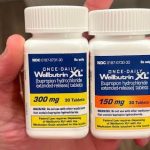What Happens When You Take Wellbutrin and Lexapro Together?

Drug-drug interactions result when two or more drugs react with each other. Such drugs can be from a combination of prescription drugs, over-the-counter (OTC) medications, or illicit drugs. Drugs with a narrow therapeutic range (little difference between therapeutic and lethal dose) are more likely to face incidents of serious drug interactions.
The effectiveness of drugs may be reduced in situations where the action of one drug diminishes the action of the other. In addition, the side effects of medications are intensified when drugs with the same effect are taken together.
What are antidepressants?
Antidepressants are prescription medicines to treat depression. Depression is more than feeling a little sad or “blue” for a few days. It’s a very common, serious medical illness that affects your mood and general mental health It can make you feel tired, hopeless, worried, or fearful. It can change your thinking, sleeping, and eating. Depression may make some people think about ending their lives.
But antidepressants can help many people who have depression. Researchers think antidepressants may help improve the way your brain uses certain chemicals that control mood or stress.
What are the different types of antidepressants?
There are many types of antidepressants. Each one works differently. Providers usually prescribe newer antidepressants first because they don’t cause as many side effects as older types. They also seem to help more kinds of depression and anxiety problems.
Most of the newer antidepressants belong to one of these three groups:
• Selective serotonin reuptake inhibitors (SSRIs)
• Serotonin and norepinephrine reuptake inhibitors (SNRIs)
• Atypical antidepressants, which are newer antidepressants that don’t fit into the other groups
If these antidepressants don’t help, your provider might suggest one of the older antidepressants. The older types include tricyclic antidepressants (TCAs), tetracyclics, and monoamine oxidase inhibitors (MAOIs). Even though these antidepressants may cause more serious side effects, the benefits may outweigh the risks for some people.
Which type of antidepressant is right for me?
Our bodies and brains all work differently. That means one antidepressant won’t work for everyone. You may need to try two or more medicines before you find one that works for you.
Your provider will work with you to choose the best option to try first. You’ll consider questions such as:
• Which symptoms bother you most? Some antidepressants may do a better job helping specific symptoms, such as trouble sleeping.
• What other medicines and supplements do you take? Some antidepressants can cause problems if you take them with certain medicines and herbs.
• Did a certain antidepressant work well for a close relative? An antidepressant that helped a parent, brother, or sister could be a good choice for you, too.
• Do you have other health conditions? Certain antidepressants can make some other conditions better or worse. Any other conditions that you have will be part of choosing your depression treatment.
• Are you pregnant, planning for pregnancy, or breastfeeding? If so, your provider will help you find a way to treat your depression that’s safe for you and your baby.
What is Wellbutrin?
Wellbutrin is a brand of bupropion, an antidepressant called a norepinephrine and dopamine reuptake inhibitor. Wellbutrin is available in two forms. Each form comes as an oral tablet with different strengths.
Wellbutrin comes in two forms: Wellbutrin SR and Wellbutrin XL. “SR” stands for sustained release, while “XL” stands for extended-release. Both forms of Wellbutrin are long-acting and release their active drug slowly into your body over time.
In the past, Wellbutrin was available in an immediate-release (IR) form. (IR means the full dose of the drug is released into your body all at once.) However, the IR form of Wellbutrin is no longer available.
Wellbutrin SR comes in three strengths: 100 milligrams (mg), 150 mg, and 200 mg. You’ll likely take Wellbutrin SR twice per day.*
Wellbutrin XL comes in two strengths: 150 mg and 300 mg. You’ll likely take Wellbutrin XL once per day.
Wellbutrin is used to treat the symptoms of major depression and seasonal affective disorder. Wellbutrin may be used alone or with other medications.
If you have questions about the differences between Wellbutrin SR and Wellbutrin XL, talk with your doctor or pharmacist.
What is Lexapro?
Lexapro is a prescription drug containing escitalopram. It’s available as an oral tablet and an oral liquid solution. It’s approved for use in adults and children 12 years and older. The medication belongs to the class of drugs called selective serotonin reuptake inhibitors (SSRIs).
Lexapro works by increasing the amount of the chemical serotonin in your brain. Having more serotonin helps decrease the symptoms of depression and anxiety. Lexapro is not considered a monoamine oxidase inhibitor (MAOI). MAOIs work by slowing down the breakdown of serotonin and dopamine, another chemical in your brain. This also helps alleviate symptoms of depression. However, MAOIs have a higher risk of side effects and drug interactions than SSRIs such as Lexapro. The typical recommended starting dose is to take 10 mg by mouth once daily. If needed, your provider might raise your dose to 20 mg daily after a week.
Is It Safe To Take Wellbutrin and Lexapro together?
Yes, studies have shown that taking Wellbutrin and Lexapro together is safe and well-tolerated. In addition, taking Wellbutrin and Lexapro together can help improve symptoms in depressed patients according to published research. A 6 month randomized clinical trial of antidepressants and combined therapy concluded that people found combined treatment significantly more acceptable, and significantly more likely to lead to recovery from depression.
However, every patient is different and some people may experience adverse reactions when combining Wellbutrin and Lexapro together. Always speak to a medical professional who understands your medical history when combining new medications. Talk to your doctor or healthcare provider to find out if the combination of Wellbutrin and Lexapro might work for you





